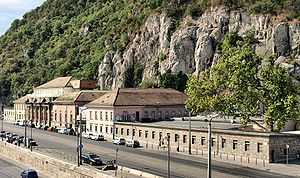Turks in Hungary
| Total population | |
|---|---|
|
Turkish minority: 1,565 (2001 census)[1] Turkish citizens: 1,700 (not including the Ottoman descended minority)[2] | |
| Languages | |
| Turkish · Hungarian | |
| Religion | |
| Muslim |
Turks in Hungary (Hungarian: Magyar Török Turkish: Macar Türkler) refers to the Turks living in Hungary which includes immigrants or the descendants of immigrants from the Ottoman Empire (before 1923), as well as immigrants from today's Turkey, or from neighbouring countries once part of the Ottoman Empire that still have a population whose language is Turkish or who claims a Turkish identity or cultural heritage. The Turks in Hungary are the Turks originated from Anatolia and not the Hungarian subgroup of Palóc, Cumans and Pechenegs Turkic people.
History
When the Turks seized Buda in 1541, the country was divided into three states. Buda and the surrounding land came underneath the direct rule of the Ottoman Turks, whilst Transylvania (previously part of Hungary) became an independent principality, loyal to the Ottomans. The rest continued to be ruled by Hungarian nobility, under the auspices of the Habsburgs.
As the Habsburg-led Austrians became the dominant force in the region, the Turks were ousted and the Kingdom of Hungary reestablished in the 18th Century.
Religion
According to the 2002 official Hungarian census, there were 3,201 Muslims living in Hungary at the time, making up 0.03% of the population.[3] The Turkish people make up the majority of the Muslim population.
Gallery
-

The pasha of Buda receives the envoy of the Ottoman Sultan.
-

Dancer with castanets. Turkish miniature by Balázs Szigetvári Csöbör, 1570.
-

Ottoman Coffee shop
-

Former Ottoman mosque in Pécs (now a church).
-
The tomb of the Turkish dervish Gül Baba in Budapest
-

Rudas Baths, a Turkish bath at the foot of Gellért Hill
Notable people
See also
- Hungary–Turkey relations
- Hungarian Turanism
- Magyarab
- Siege of Eger
- Kaliz
- Almış (Almas) iltäbär
References
- ↑ Hungarian Central Statistical Office. "Factors of the nationality of the population based on affiliation with cultural values, knowledge of languages". Retrieved 2013-05-21.
- ↑ Rep. of Turkey Ministry of Foreign Affairs. "Turkey's Political Relations with Hungary". Retrieved 2009-10-24.
- ↑ http://www.nepszamlalas.hu/hun/kotetek/18/tables/prnt2_38_1.html



